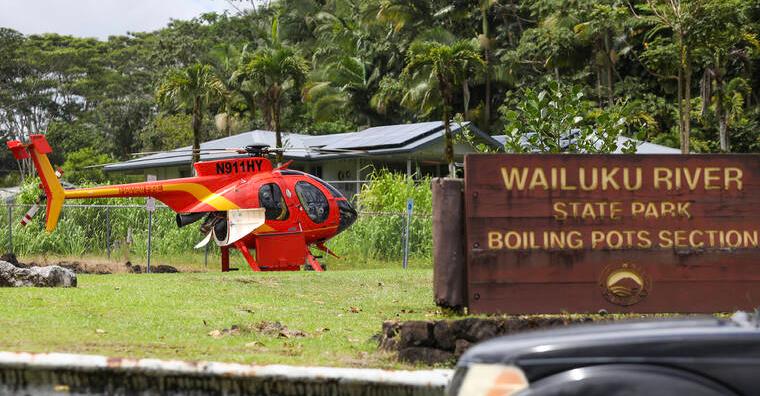Hawai’i police have identified the man who tragically lost his life in the waters of the Wailuku River last week. The victim has been confirmed as 42-year-old Stanley Walker II, a resident of Pensacola, Florida. Walker’s body was found in the Boiling Pots section of the river, a notorious site in Hilo, Hawaiʻi, known for its scenic beauty and treacherous waters.
The incident occurred on Tuesday, September 17, 2024. According to the Hawai’i Police Department, at 1:33 p.m., South Hilo patrol officers received an emergency call reporting a swimmer in distress. Witnesses at the scene described seeing an unidentified man, later identified as Walker, entering the water only to be immediately pulled under by the river’s powerful currents. Despite frantic efforts to locate him, the swift waters made it impossible for him to resurface, and witnesses lost sight of him entirely.
Boiling Pots, where the tragedy occurred, is part of a stretch of the Wailuku River where water cascades through a series of deep pools. While it is a popular spot for sightseeing, swimming there is particularly perilous due to the strong currents and sudden drops in water levels. The river’s turbulent nature has made it infamous for similar drownings, with local authorities frequently cautioning both tourists and residents against entering the water.
Rescue efforts were immediately launched by the Hawai’i Fire Department, along with support from the State Department of Land and Natural Resources (DLNR) Division of Conservation and Resources Enforcement. Despite an exhaustive search on the day of the incident, Walker could not be found.
Two days later, on Thursday, September 19, 2024, rescue personnel were able to locate and recover Walker’s body. According to officials, his remains were discovered approximately 30 feet below the surface of one of the deep pools in Boiling Pots. The recovery took place at around 2:10 p.m. His body was later transported to Hilo Benioff Medical Center, where he was officially pronounced dead.
An autopsy was performed on Walker’s body earlier this week. A forensic pathologist confirmed that the cause of death was drowning, consistent with the circumstances of his disappearance in the river’s fast-moving waters.
The tragic loss has drawn attention once again to the dangers associated with Hawaiʻi’s natural attractions. Despite their beauty, rivers like the Wailuku pose significant risks to even experienced swimmers due to their unpredictable nature. According to the DLNR, drownings in areas such as Boiling Pots are not uncommon, particularly after heavy rainfall, when water levels and currents can change rapidly.
Hawai’i authorities have long stressed the importance of heeding warning signs posted in hazardous areas and have urged both tourists and residents to exercise caution. In a statement, the DLNR emphasized that many of the state’s rivers, waterfalls, and coastal waters are unpredictable and can change drastically within moments, especially in regions with heavy rainfall like Hilo.
This tragic incident serves as a reminder of the need for extreme caution when navigating Hawaiʻi’s waterways. The state’s scenic landscapes, while breathtaking, can be deceptive in their danger. Hawai’i Police continue to investigate the circumstances surrounding Walker’s death, and they are asking anyone with information to come forward. Those who may have witnessed the incident or have additional details are encouraged to contact Detective Kimo Keli’ipa’akaua of the Area I Criminal Investigations Section at (808) 961-2375 or via email at kimo.keliipaakaua@hawaiicounty.gov.
As authorities work to piece together the events leading up to Walker’s death, his family and friends are left to mourn the sudden and heartbreaking loss of a man whose life was cut short during what was likely a visit to one of Hawaiʻi’s renowned natural sites. For now, the incident remains a sobering reminder of the powerful forces of nature at play in even the most idyllic locations.
In closing, this tragedy adds to the growing list of fatal accidents in Hawaiʻi’s waterways. Officials urge the public to remain vigilant and informed about the conditions of these natural areas before entering them, especially during the rainy season when the risks are highest.
